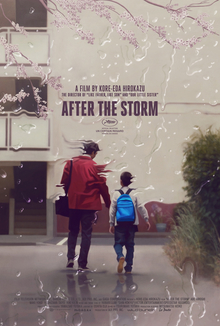 When it comes to After The Storm (2016), even the titanic forces of a typhoon are not enough to burst the bonds a family can place on its children. A decade ago, Ryota Shinoda won an important award for his first novel, mostly based on his family’s dysfunction, but ever since he’s found himself unable to write anything else. Now he’s working at one of those “private detective” agencies in Tokyo where the standard case is to take pictures of someone cheating on their spouse, and provide them to the spouse for future divorce purposes. He has a son; an ex-wife, Kyoko; unmet child support obligations; a disastrous gambling habit; and an elderly mother.
When it comes to After The Storm (2016), even the titanic forces of a typhoon are not enough to burst the bonds a family can place on its children. A decade ago, Ryota Shinoda won an important award for his first novel, mostly based on his family’s dysfunction, but ever since he’s found himself unable to write anything else. Now he’s working at one of those “private detective” agencies in Tokyo where the standard case is to take pictures of someone cheating on their spouse, and provide them to the spouse for future divorce purposes. He has a son; an ex-wife, Kyoko; unmet child support obligations; a disastrous gambling habit; and an elderly mother.
The movie opens on him raiding his mother’s house for anything he can pawn. His sister reprimands him once again for using the family’s secrets as materials for the book; his ex-wife, now dating another man, controls his access to his son, who her new beau is now shepherding through life. And she’s quite dubious about letting her ex-husband have anything to do with their son.
But he finally gets his afternoon with the kid, and, using money he’s scrounged and a dubious bargaining tactic, gets his son the baseball cleats he thinks he wants. He also introduces him to gambling, much to his ex-wife’s chagrin, but when the typhoon comes rolling in and traps them at his mother’s apartment, this is a chance to strengthen his bond with his son, and perhaps renew the one with his ex-wife.
The former is relatively simple, as boys look to their fathers for guidance, even flawed fathers, but Kyoko has seen too much of his wastrel side, and so he won’t win her back, no matter how desperate he may be. The story is not a typical Western happy-ending, but a commentary on the difficulty of breaking free from the bonds laid upon you in childhood, and how they define one’s place in life.
This is not an exciting, fast-paced adventure. It ambles about, sniffs the roses, makes you wonder if there’s any truly sympathetic characters (I vote for the elderly mother, who has some cutting early lines of dialog that we really enjoyed, and has a secret or two of her own to point fingers at), and refuses to cater to predictable audience members’ desires – at least in America. This is a Japanese movie, however, and thus could be standard fare for the Japanese viewer.
If you’re in the mood for something that requires attention and won’t alarm you with gunshots, then this might be for you. But it takes a little patience.




